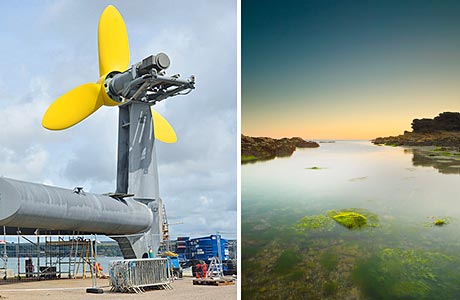
TIDAL power equipment supplier Atlantis Resources was awarded a £7.5 million two-year contract in late August to support further development of the MeyGen tidal stream array – said to be the world’s largest – in the Pentland Firth. The deal caps a summer of important announcements for the UK tidal power sector.
Awarded by the UK’s Energy Technologies Institute (ETI), the contract is to deliver a multi-turbine foundation structure which will support a further two turbines at the Atlantis-owned MeyGen array.
The agreement marks the start of Phase 2 of ETI’s Tidal Energy Converter Project. This will see two Atlantis-owned 1.5MW commercial tidal energy turbines installed on “an innovative foundation structure” designed and built as part of the ETI-funded project.
The project was negotiated separately to, and comes hot on the heels of, the company’s recently funded 6MW tidal turbine array at the MeyGen site. It will increase the number of turbines at the site from four to six and the rated capacity of the tidal array from 6MW to 9MW, enough to power 4,500 local homes.
The ETI originally commissioned the first phase of the Tidal Energy Converter Project (“TEC Phase 1”) in May 2012, following a competitive tender which was won by a consortium led by Atlantis. TEC Phase 1 adopted a total system lifetime cost of energy methodology to identify, develop and prove tidal energy system technologies capable of significantly reducing cost of energy and of being deployed at array scale. As a result, the ETI has developed a patent-pending innovative and cost effective turbine foundation design which will be deployed during TEC Phase 2.
The second phase of the project, TEC Phase 2 awarded to Atlantis, will run over three stages, commencing with detailed design, fabrication and installation of the turbine foundation structure. Atlantis will be responsible for turbine supply and electrical connection to the local grid.
Meanwhile, on 7 August, Wales’ first full-scale tidal energy generator was opened at Pembroke Court. The system will employ Tidal Energy’s DeltaStream device, an installation that the company says will be among the world’s first grid-connected demonstration devices to generate green, sustainable and predictable tidal power.
Welsh woes
September brought less positive news for Welsh tidal power, with the announcement that the £70 million Skerries Tidal Stream Array in Anglesey – which had previously won Welsh government backing and £10 million of UK government funding – is to be suspended.
The project would have seen five tidal generators located in up to 40m of water half a mile from Holyhead. The developers, Siemens, offered little explanation for the decision to put the project on hold, but merely said it was discussing “different opportunities”.
Rhun ap Iorwerth of the Welsh Assembly told the BBC he was “bitterly disappointed” and hoped the project would be revived.







